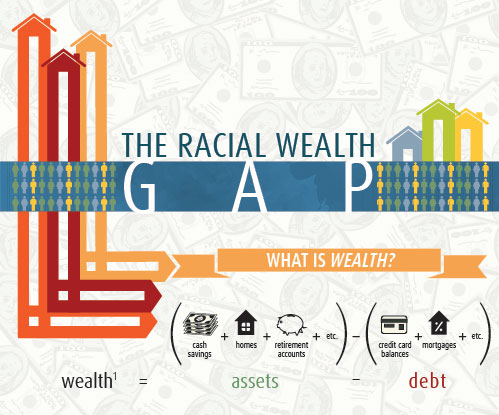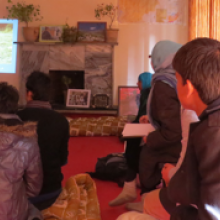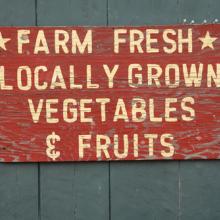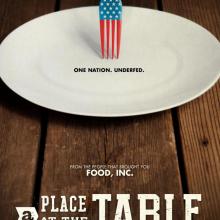Hunger
Market speculation and pursuit of profits are hindering the global fight against hunger and poverty, Pope Francis said Nov. 20.
In an address at a U.N. conference in Rome on nutrition, the pope urged the world’s wealthiest nations to do more to help those in need.
“Perhaps we have paid too little heed to those who are hungry,” the pope told delegates from more than 170 countries attending the global gathering at the U.N.’s Food and Agriculture Organization.
“It is also painful to see that the struggle against hunger and malnutrition is hindered by ‘market priorities,’” the pope said.
“The hungry remain, at the street corner, and ask to be recognized as citizens, to receive a healthy diet. We ask for dignity, not for charity.”
The Argentine pope has often called for greater compassion and justice for the world’s poor since his election last year, and he has made charity a priority of his pontificate.
ELIZABETH PALMBERG—Zab to her friends—says her motto is “Cherish each moment, even the ones that suck.”
Nine years ago, she was diagnosed with Hodgkin’s lymphoma. She has had her ups and downs in her battle against cancer, but many moments in that journey have undeniably sucked.
In 2001, Zab was a college professor in California when she applied to be an intern at Sojourners. We decided her Ph.D. (in Victorian literature) perhaps qualified her to do the data entry and fact-checking work required of our editorial intern, and when her yearlong internship was over we invited her to become a full-time member of the editorial staff.
She’s been gracing us, and our readers, with her brilliant analysis and quirky wit ever since. Her knowledge, passion, and insight informed and often challenged those of us who’ve worked closely with her—and led to outside recognition as well. In 2011, for instance, Zab joined a Witness for Peace delegation to Colombia, visiting communities engaged in the difficult work of peacebuilding and conflict resolution. Her report on the trip—the last feature she wrote for the magazine—was honored by the Associated Church Press as the best news article of the year.
In November 2012, she wrote on her blog, “Just as I was planning a big six-year hey-they-cured-my-cancer party, it turned out I have cancer again.” Months of difficult treatment followed, and she chronicled the good times and the bad with (most of the time) her sense of humor firmly intact. For instance, she wrote that “technically, the exact wrong thing to read [during chemotherapy] is Thomas Hardy’s Jude the Obscure, which also happens to be the wrong thing to read in almost *every* context—that book really puts the “ick” in ‘Victorian.’ My deepest apologies to the one class I forced to read it. I don’t know what I was thinking.”
Two weeks ago in a room in Kabul, Afghanistan, I joined several dozen people — working seamstresses, some college students, socially engaged teenagers, and a few visiting internationals like myself — to discuss world hunger. Our emphasis was not exclusively their own country’s worsening hunger problems. Rather, tmhe Afghan Peace Volunteers, in whose home we were meeting, draw strength from looking beyond their own very real struggles.
With us was Hakim, a medical doctor who spent six years working as a public health specialist in the central highlands of Afghanistan and, prior to that, among refugees in Quetta, Pakistan. He helped us understand conditions that lead to food shortages and taught us about diseases, such as kwashiorkor and marasmus, which are caused by insufficient protein or general malnutrition.
We looked at U.N. figures about hunger in Afghanistan, which show malnutrition rates rising by 50 percent or more compared with 2012. The malnutrition ward at Helmand Province’s Bost Hospital has been admitting 200 children a month for severe, acute malnutrition — four times more than in January 2012.
A recent New York Times article about the worsening hunger crisis described an encounter with a mother and child in an Afghan hospital: “In another bed is Fatima, less than a year old, who is so severely malnourished that her heart is failing, and the doctors expect that she will soon die unless her father is able to find money to take her to Kabul for surgery. The girl’s face bears a perpetual look of utter terror, and she rarely stops crying.”
Photos of Fatima and other children in the ward accompanied the article. In our room in Kabul, Hakim projected the photos on the wall. They were painful to see and so were the nods of comprehension from Afghans all too familiar with the agonies of poverty in a time of war.
WHEN MOST PEOPLE remember George McGovern, the longtime South Dakota senator who passed away in 2012, they probably don’t think first of his evangelical Christian background or see him as a model for evangelicals today.
But McGovern, the Democratic nominee who ran against President Richard Nixon in 1972, actually serves as a worthy exemplar of evangelically rooted social action.
The source of McGovern’s progressive and moral political views may be surprising to some. He was a son of the evangelical church. His father, Rev. Joseph McGovern, was an ordained minister of the Wesleyan Methodist Church (now the Wesleyan Church). It was founded in 1843 as a protest movement against the larger Methodist Episcopal Church. Simply put, they thought slavery sinful and left the denomination to make clear their moral opposition to the “peculiar institution.”
George McGovern enjoyed a good relationship with his father. His childhood was shaped by the rhythms of church life—three or four services on Sunday, prayer meeting on Wednesday night, and daily prayer and Bible readings. The annual family vacation was a two-week campout at nearby Mitchell Holiness Campground. Revival services were conducted nightly.
SNAP began in 1964 when President Lyndon B. Johnson signed the Food Stamp Act as part of his unconditional “War on Poverty.” In his remarks upon signing, Johnson said: “I believe the Food Stamp Act weds the best of the humanitarian instincts of the American people with the best of the free enterprise system. Instead of establishing a duplicate public system to distribute food surplus to the needy, this act permits us to use our highly efficient commercial food distribution system.”
Johnson continued: “It is one of many sensible and needed steps we have taken to apply the power of America's new abundance to the task of building a better life for every American.”
Imagine. Fifty years ago the Food Stamp Act was viewed not as charity, but rather as an ingenious utilization of American enterprise in order to help “build a better life for every American.”
And it is genius.
Many of us may not know what it is like to be hungry, to regularly miss meals, or to consume a diet void of essential nutrients to live a healthy life. Poet, diplomat, and politician Pablo Neruda captures this feeling well in his poem “The Great Tablecloth.” Just before the holidays, millions of Americans learned what some aspect of hunger felt like as they saw a reduction in their SNAP (formerly food stamp) benefits.
On Nov. 1, every SNAP household saw its grocery budget reduced when an $11 billion cut went into effect — the equivalent of 10 million food stamp meals a day. And the program isn’t out of the woods yet. The House and Senate have begun to finalize a farm bill that will impact vital anti-hunger programs. A compromise proposal expected in the coming weeks could further cut SNAP by as much as $8 billion, at a time when lawmakers need to protect and strengthen it.
The central figures in four of the planet’s largest religions – Christianity, Islam, Buddhism, and Judaism – were all once homeless. Moses was encamped in the Sinai, unable to return to the Promised Land. Jesus was born in a manger. Buddha wandered through the wilderness seeking enlightenment. The Prophet Muhammad was forced out of Mecca.
Is it a coincidence that each of these figures was, at key parts of his life, dispossessed from the society around him? Hardly. This is a clear message that even the most powerful can be made powerless.
In both Leviticus and Deuteronomy, believers are directed to give a set portion of their harvest to people in poverty and immigrants. It is neither voluntary, nor are the amounts to be based on charitable whims. It is a commandment to automatically give a specific percent, making it an anti-hunger tax of sorts. In fact, both the Old and New Testaments make it clear that justice is a higher calling than mere charity.
In Mathew 25, not only does Christ proclaim that those who clothe, house, and feed the “least of these” are engaging in acts equivalent to directly aiding the Lord, he also preaches that those who refuse to aid the poor are consigned to damnation.
Most secular ethical traditions also make societal actions to reduce hunger, poverty, and homelessness a centerpiece of their teachings.
Virtually every elected official in Washington claims to abide by these ethical and faith-based traditions. Indeed, many have used their professions of faith to advance their political careers.
Yet many of these same leaders repeatedly take actions opposite to the values they espouse.
In his first Advent address, Pope Francis directed Christians to be guided by the “Magnificat,” Mary’s song of praise for the coming Christ child. She proclaims that God has “lifted up the lowly and filled the hungry with good things” (Luke 1:52-53). This past Tuesday, Pope Francis heeded his own exhortation by releasing a video message calling for an end to hunger as part of a worldwide “wave of prayer.”
Hundreds of Christian organizations across the globe participated in the “wave of prayer,” which was organized by Caritas International, a confederation of Catholic charities in the Vatican.
“We are in front of a global scandal of around 1 billion people who still suffer from hunger today,” Pope Francis said in his message. “We cannot look the other way.” The wave began at noon on the Pacific island of Samoa and proceeded west with people of faith from each subsequent time zone participating at noon their time.
“Whoever has two coats must share with anyone who has none; and whoever has food must do likewise.” (Luke 3:11)
Many of us are blessed enough to not know what it is like to be hungry, to regularly miss meals, or to consume a diet void of essential nutrients for a healthy life. But now, millions of our brothers and sisters here in the United States may, sadly, be facing these situations because of a reduction in their food stamp benefits.
Starting Friday, all households receiving food stamp benefits will see their food budgets shrink as a temporary increase expires. A family of four could lose up to $36 a month in food stamps (also known as the Supplemental Nutrition Assistance Program, or SNAP).
Before I saw the new film 12 Years A Slave, I knew nothing about Solomon Northrop or his astounding story of courage, forbearance, and faith.
I’d never heard of Northrop, an African-American freeman, who was born and reared in upstate New York in the early 1800s, well before the abolition of slavery in the rest of the nation. I’d not known of the historical practice of kidnapping freeborn black Americans in the North and selling them into slavery in the South.
I’d never heard about how Northrop, an accomplished violinist, was bamboozled into traveling from his farm in Hebron, N.Y., where he lived a prosperous life with his wife and three children, to Washington, D.C., for work, but was drugged, kidnapped, and sold in Louisiana. I’d never heard how he remained for a dozen years before heroically regaining his freedom in 1853 — one of a very few kidnapped freemen and freewomen ever to regain their freedom.
My child ate today. Breakfast was pancakes and sausage.
Walking to school I said, “If you don’t like the leftover hamburger that I put in your lunchbox, just buy something from the cafeteria. You have plenty of money in your account.”
Tonight we will have tacos, but if I am too tired to cook, we will order pizza.
I am grateful that I can feed my child every day.
House leaders are proposing a massive cut to SNAP (Supplemental Nutrition Assistance Program), America’s frontrunner in combatting hunger. This new proposal consists of a $40 billion reduction in funding, and SNAP households across the board would be feeling the pinch beginning as soon as November.
Potential cuts reveal stark and sobering statistics that millions of Americans would face:
- The average benefit per person, per meal would decrease to below $1.40, dangerously low to maintain the minimum standards of a healthy diet;
- 210,000 kids would be cut from free school meals;
- SNAP cuts would be the equivalent of taking away 21 meals per month from a four-person household; and
- 170,000 veterans would lose out on food benefits.
As a nutrition student in college, I paid attention to the food we would eat on campus and became keenly aware of how much plastic and material was used and disposed of because of the way our food was packaged. It upset me to see so much packaging thrown in the trash every day. I raised concerns with the Dining Services committee and became a staunch advocate for a better recycling program on campus.
That was my first foray into understanding the relationship between the food system and environmental concerns and their consequent impact on health – something that became a much larger part of my life upon graduation, when I read the book The Omnivore’s Dilemma by Michael Pollan and joined a network of dietitians focused on Hunger & Environmental Nutrition.
The more I read and learned, the more I came to understand the sobering facts about the impacts that our industrial food system has on our society. Power in agriculture has become more and more concentrated over the past several decades, leading to many “monocrops” – large swaths of land devoted to growing only one type of crop rather than a diversity of crops that keeps fields vibrant and healthy. We’ve seen unprecedented extinction of species as a result. Artificial fertilizers lead to soil runoff, nitrous oxide emissions, and pesticides polluting our waterways.
 The United States is the richest country in the world, but only three-quarters of Americans have enough to eat.
The United States is the richest country in the world, but only three-quarters of Americans have enough to eat.
New data from the Pew Research Center shows that nearly a quarter of Americans had trouble putting food on the table last year — 24 percent is a lot of hungry people in the richest country in the world. It’s not normal, either – most other advanced economies had much lower rates of hunger. We think that the U.S. economy is similar to that of Canada or Britain; our hunger rate is closer to that of Indonesia, South Korea, or Greece.
Numbers like that are shocking, because we prefer to think of ourselves in nationalistic terms. “The richest, most powerful country on Earth” definitely makes us feel better than realizing that things aren’t so great for many of us. One in four of us is hungry.
We don’t like to think about this, but we aren’t doing so well by a lot of standards. Last month, UNICEF published a report on child wellbeing in developed countries. The United States was ranked 26 out of 29, above Lithuania, Latvia, and Romania. Our children were doing worse than those of Greece.
Is this really where we want to be?
By definition, an anesthetic is a drug used to relieve pain (analgesia), relax (sedate), induce sleepiness (hypnosis), spark forgetfulness (amnesia), or to make one unconscious for general anesthesia. Anesthetics are generally administered to induce or maintain a state of anesthesia and facilitate a procedure. I believe that anesthetic can be employed as a striking image for particular deficiencies in faith-based responses to extreme poverty.
As one can cite many examples where faith is proclaimed and practiced solely as an escape from – rather than engagement with – the numerous struggles associated with impoverishment, we recognize that anesthesia is incomplete without corresponding acts of sustainable social surgery.
...
A practical way to serve within the tension of anesthetic and advocate is to experience a small portion of life below the poverty line. The World Bank sets extreme poverty as below $1.50 per day, and I plan to stand in solidarity by attempting to eat on less than $1.50 per day over the course of five days (Monday – Friday).
The announcement was broadcast at the end of the day over the school’s public address system.
"Our Teacher of the Year for 2013-2014 is ... Mr. Barton. Congratulations!"
I walked out into the third-grade hallway where students were lined up for dismissal. Little hands reached up and patted me on the shoulder. Small voices joined together and called out, "We're proud of you, Mr. Barton!" Alondra, a quiet student, pulled me close and said, "Thank you for being my reading teacher." I was honored and humbled.
As I walked back into my classroom, I reflected over my five years teaching at this Title I elementary school. "Who am I, what have I done, to become Teacher of the Year?" I asked myself.
“I believe the sequester is a pittance.”
Those were conservative Sen. Rand Paul’s words in an opinion piece this week about the sequester – severe and arbitrary cuts to the federal budget that Congress did nothing to stop. We could give him the benefit of the doubt and assume he hasn’t seen the numbers:
- The nutrition program for women with children — WIC — will have to turn away 600,000 to 775,000 women, many of whom have young children.
- The 3.8 million currently unemployed workers will have their support cut by 11 percent.
- 100,000 low-income families will lose their housing vouchers.
- 125,000 individuals and families are now at risk of homelessness.
That doesn’t sound like a “pittance” to me.
A new documentary from the producers of Food, Inc. premieres today, serving up the critical problem of rising hunger in the United States with a surprising thesis: we’ve already solved it.
… Forty years ago, that is. A Place at the Table, the newest documentary from Participant Media, reveals how political will in the 1960s and 70s ushered in an era of bipartisan-sponsored, government-funded programs that “nearly solved” the problem of hunger.
Compare that with today, in which 50 million Americans rely on food assistance programs – and nearly one-in-two children will require food assistance in their lifetimes. The stark disparity between then and now begs the question: what happened?

















